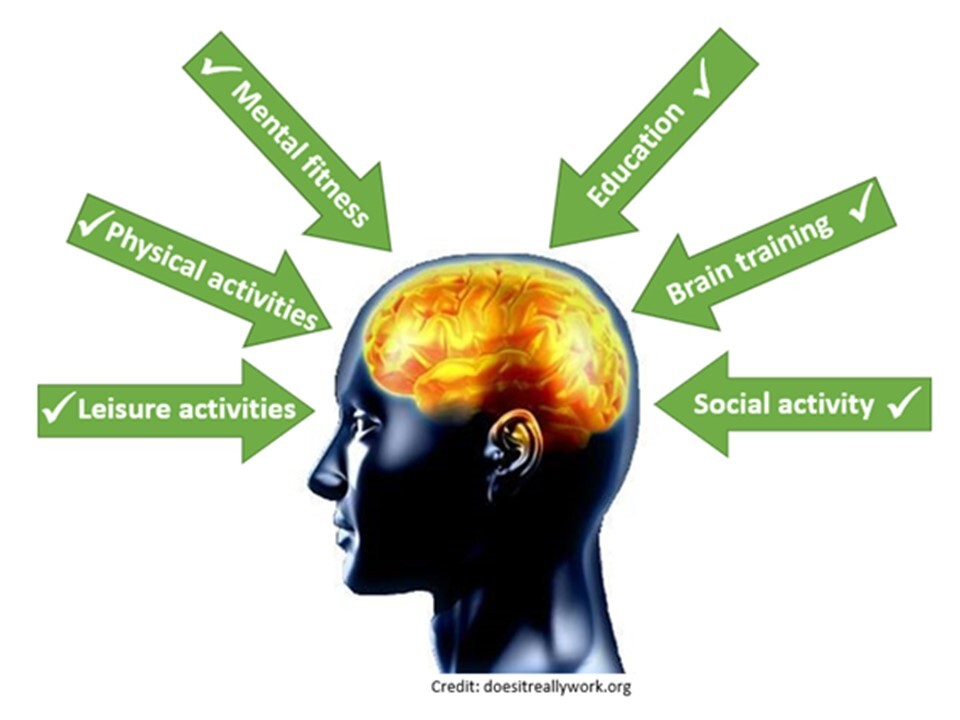In this article, we answer these important questions about reducing the risk of developing dementia:
- Can keeping mentally fit reduce the risk of dementia?
- Can education in later life help exercise the brain?
- Can leisure activities stimulate the brain?
- What about staying socially active?
- What about brain training?
- Can staying physically active help too?
Can keeping mentally fit reduce the risk of dementia?
The ‘cognitive reserve’ hypothesis suggests that if we stay mentally active throughout our lives – for instance by developing new interests and skills – then this activity develops our brain and builds some form of reserve which helps protect against, or compensate for, dementia.
|
You can think of cognitive reserve as your brain’s ability to improvise and find alternative ways of getting a job done. Harvard Health Publishing |
This idea arose when researchers found a discrepancy between the amount of brain damage and the severity of cognitive decline observed in people with dementia, and they began to research possible reasons for this. They found that high levels of education, involvement in occupational, leisure, and physical activities, as well as maintaining social networks, are all associated with a greater cognitive reserve.
The mechanisms involved are unclear. Perhaps larger or denser brains can tolerate more loss before brain functions are impaired. Perhaps the same brain networks have been helped to work more efficiently. Or it might be that the brain is able to shift operations to alternative circuits.
Higher cognitive reserve is associated with a delay in the onset of mild cognitive impairment due to Alzheimer’s disease. This has short- and long-term benefits, for instance, having less reliance on carers, the ability to be active members of family and community, and living independently for longer.
Can education in later life help exercise the brain?
As part of a University of Tasmania project, the Tasmanian Healthy Brain Project, a group of 359 older adults who had completed a minimum of 12 months part-time university study were compared with a group of 100 adults who had no higher education. The results showed an increase in cognitive reserve over a 4-year period in substantially more of the participants with a higher education than in the adults who had no higher education. These findings suggest that education in later life, as well as in early life, can offset cognitive decline.
Can leisure activities stimulate the brain?
Participation in leisure activities has also been associated with a lower risk of dementia. Research carried out by University College London using the English Longitudinal Study of Ageing showed that increased involvement in leisure activities, such as reading newspapers, using mobile phones and having hobbies, was associated with a decreased incidence of dementia in married individuals (but not in single, divorced or widowed individuals). This might be partly explained by some evidence showing that being married is associated with a healthier lifestyle and thus also with a reduced risk of dementia.
However it is not yet clear whether increased participation in leisure activities actually does lower the risk of dementia or whether participation in leisure activities declines during the preclinical phase of dementia i.e., when dementia is already present, but before the symptoms are clear.
Combining cognitive-stimulating activities with physical exercise has been shown to provide cognitive benefits both to people with mild cognitive impairment and to those with dementia. That was according to a 2017 analysis of ten randomized trials. In addition, activities of daily living (for instance, feeding oneself, bathing, dressing, grooming, work, and homemaking) and, to a lesser extent, mood also improved.
Passive leisure activities like watching TV, unfortunately seem to hinder rather than help. Research presented at the Epidemiology and Prevention – Lifestyle and Cardiometabolic Health conference (American Heart Association) held in late May 2021 showed that older adults experience greater cognitive decline if they report higher levels of television viewing, although there seemed to be no increased risk of dementia.
What about staying socially active?
To live well with dementia, staying socially active is important. Not only does it benefit the person, but it also benefits the carer. Staying connected, or reconnecting, with family and friends is highly recommended for reducing the risk of dementia. Other options include joining a group activity such as a book club, a sports club, a volunteer group, a continuing education class or some kind of community activity. Many communities are now dementia-friendly. For example, dementia-friendly screenings of the latest films by cinemas, or dementia-friendly swimming sessions at leisure centres. You can search for local dementia support groups on the Alzheimer’s Society’s website.

Research into this topic has shown mixed results. However, one specific type of computerised brain training, known as speed of processing cognitive training, has shown promising results. This screen-based exercise is designed to improve a person’s speed and accuracy of visual attention and their mental quickness. The researchers found that older adults’ risk for dementia was reduced by 48 percent over 10 years.
Can staying physically active help too?
The evidence suggests that exercise – both aerobic and resistance (weight-lifting) training – is beneficial for cognitive function in older healthy adults. A 2020 review of the evidence for aerobic exercise showed that physical activity can also promote improvements in cognition, independent living, and/or mental health in individuals with cognitive decline and dementia.
|
Regular physical activity decreases the risk of developing Alzheimer’s disease, even in those with mild cognitive impairment. |
For individuals with early-stage Alzheimer’s disease, aerobic exercise either by itself or in combination with cognitive stimulation brings about improvements in some aspects of brain function.
|
Promoting changes in lifestyle in pre-symptomatic and predementia disease stages may have the potential for delaying one-third of dementias worldwide. J Health Sports Science |
Increasing evidence suggests that the benefits of regular physical activity for Alzheimer’s disease may result from its inhibiting action on different molecular pathways involved in the development and progression of the condition.

Conclusions
- Keeping mentally active throughout our lives seems to be associated with a reduced risk of cognitive impairment and a reduced risk of dementia.
- It may be that mental activity builds a ‘cognitive reserve’ which helps protect the way our brains function as we get older.
- Keeping physically and socially active, and getting involved in leisure and educational activities, also seem to be associated with a reduced risk of dementia.
Reviewed and updated by Barbara Baker February 2022. Next review date January 2026.
Other relevant articles on the Age Watch website:
- Illnesses: Dementia
- Mind: What happens to our brains as we get older?
- Mind: Keep mentally fit as we get older
- Mind: Building our resilience
- Living longer: Look after your body
- Ageing: Process of Ageing - the role of telomeres





